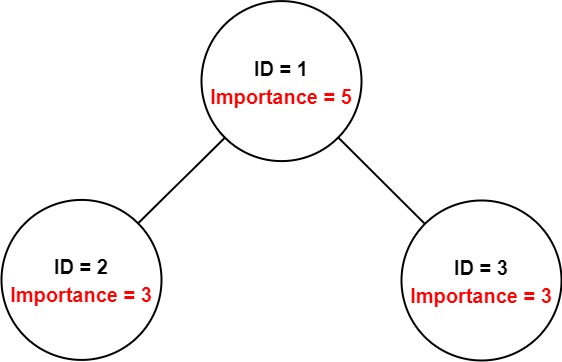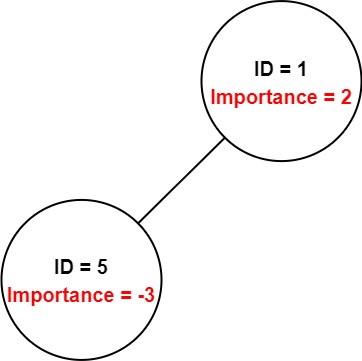Algorithm
Problem Name: 690. Employee Importance
Problem Link: https://leetcode.com/problems/employee-importance/
You have a data structure of employee information, including the employee's unique ID, importance value, and direct subordinates' IDs.
You are given an array of employees employees where:
employees[i].idis the ID of theithemployee.employees[i].importanceis the importance value of theithemployee.employees[i].subordinatesis a list of the IDs of the direct subordinates of theithemployee.
Given an integer id that represents an employee's ID, return the total importance value of this employee and all their direct and indirect subordinates.
Example 1:

Input: employees = [[1,5,[2,3]],[2,3,[]],[3,3,[]]], id = 1 Output: 11 Explanation: Employee 1 has an importance value of 5 and has two direct subordinates: employee 2 and employee 3. They both have an importance value of 3. Thus, the total importance value of employee 1 is 5 + 3 + 3 = 11.
Example 2:

Input: employees = [[1,2,[5]],[5,-3,[]]], id = 5 Output: -3 Explanation: Employee 5 has an importance value of -3 and has no direct subordinates. Thus, the total importance value of employee 5 is -3.
Constraints:
1 <= employees.length <= 20001 <= employees[i].id <= 2000- All
employees[i].idare unique. -100 <= employees[i].importance <= 100- One employee has at most one direct leader and may have several subordinates.
- The IDs in
employees[i].subordinatesare valid IDs.
Code Examples
#1 Code Example with C++ Programming
Code -
C++ Programming
// BFS
class Solution {
public:
int getImportance(vector<Employee*> employees, int id) {
unordered_map<int, Employee*>m;
for(auto x: employees) m[x->id] = x;
int sum = 0;
deque < Employee*>q;
q.push_back(m[id]);
while(!q.empty()){
auto p = q.front();
q.pop_front();
for(auto x: p->subordinates) q.push_back(m[x]);
sum += p->importance;
}
return sum;
}
};
// DFS
class Solution {
public:
int getImportance(vector < Employee*> employees, int id) {
unordered_map<int, Employee*>m;
for(auto x: employees) m[x->id] = x;
int sum = 0;
DFS(m, id, sum);
return sum;
}
void DFS(unordered_map < int, Employee*>& m, int id, int& sum){
sum += m[id]->importance;
for(auto x: m[id]->subordinates) DFS(m, x, sum);
}
};
Input
Output
#2 Code Example with Javascript Programming
Code -
Javascript Programming
const GetImportance = function (employees, id) {
const map = {}
employees.forEach((employee) => {
map[employee.id] = employee
})
const s = [id]
let importance = 0
while (s.length) {
let current = map[s.pop()]
importance += current.importance
if (current.subordinates.length) {
s.push(...current.subordinates.reverse())
}
}
return importance
}
Input
Output
#3 Code Example with Python Programming
Code -
Python Programming
class Solution:
def getImportance(self, employees, id):
"""
:type employees: Employee
:type id: int
:rtype: int
"""
def dfs(id):
self.val += dic[id].importance
for sub in dic[id].subordinates:
dfs(sub)
dic = {}
for emp in employees:
dic[emp.id] = emp
self.val = 0
dfs(id)
return self.val
Input
Output
#4 Code Example with C# Programming
Code -
C# Programming
using System.Collections.Generic;
using System.Linq;
namespace LeetCode
{
public class _0690_EmployeeImportance
{
public int GetImportance(IList < Employee> employees, int id)
{
var map = employees.ToDictionary(e => e.id, e => e);
return DFS(map, id);
}
private int DFS(IDictionary < int, Employee> map, int id)
{
var result = map[id].importance;
foreach (var subId in map[id].subordinates)
result += DFS(map, subId);
return result;
}
public class Employee
{
public int id;
public int importance;
public IList < int> subordinates;
}
}
}
Input
Output
